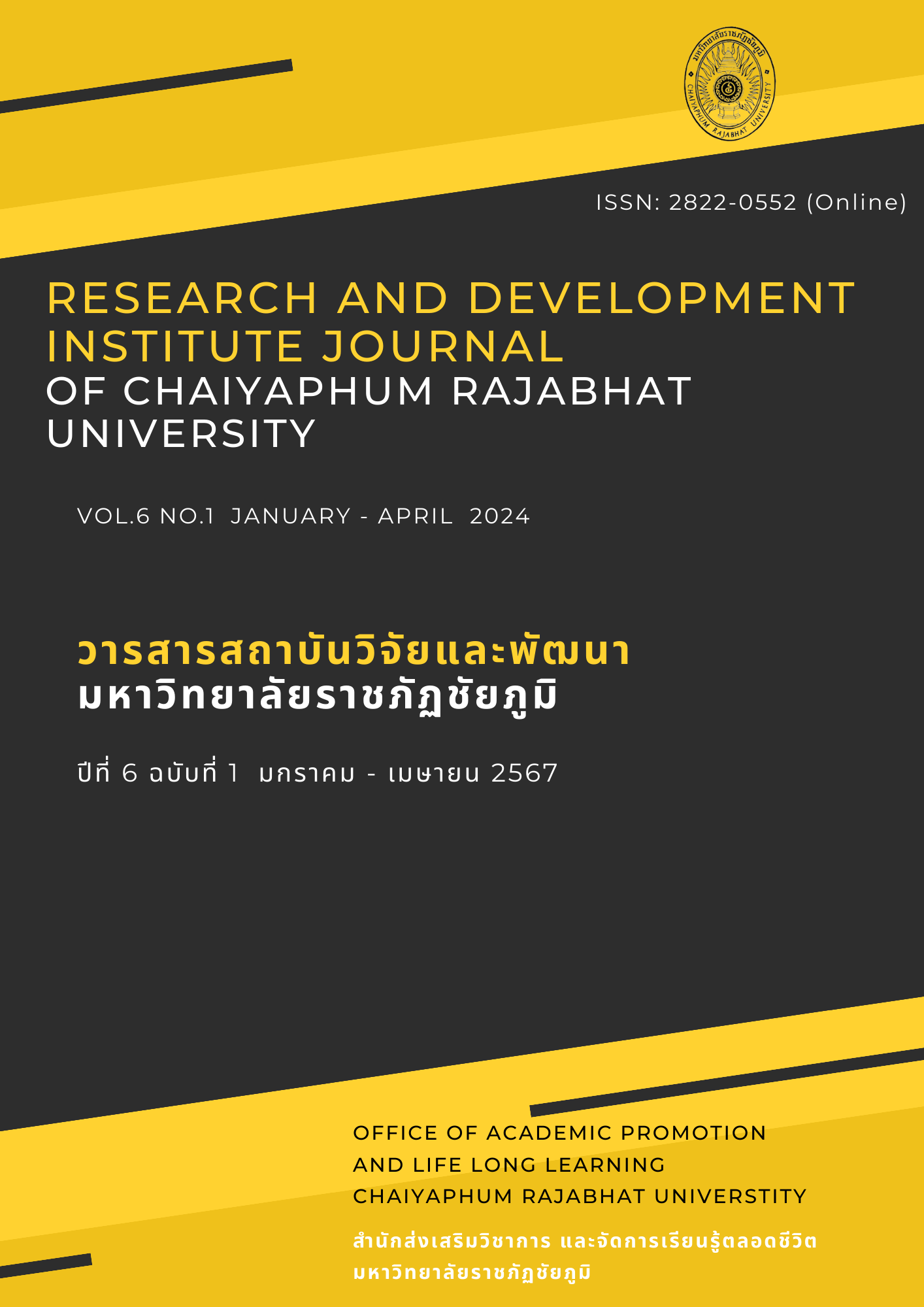THE DEVELOPMENT OF E-LEARNING MODULES WITH SELF-DIRECTED LEARNING IN THE MAN AND ENVIRONMENT COURSE FOR UNDERGRADUATE STUDENTS AT NORTH BANGKOK UNIVERSITY
Main Article Content
Abstract
This research aimed to 1) develop an e-learning course with self-directed learning for the Man and Environment course for undergraduate students, 2) compare the academic achievement before and after learning with the e-learning course with self-directed learning, and 3) investigate the satisfaction of undergraduate students with the e-learning course with self-directed learning for the human-environment course. The sample consisted of 50 undergraduate students at North Bangkok University, semester 1, academic year 2023, who were enrolled in group 1 of the Man and Environment course. The sampling method was cluster sampling, by drawing lots for 1 group from 3 groups. The research instruments were 1) an e-learning course with self-directed learning, 2) an academic achievement test, and 3) a satisfaction questionnaire developed by the researcher. The statistics used in the study were mean, standard deviation, and t-test.
The research findings indicated that 1) the e-learning course with self-directed learning was effective with a score of 81.76/83.20, which was higher than the criterion of 80/80. 2) students' academic performance significantly improved after the implementation of e-learning lessons integrated with self-directed learning, with statistical significance at the .05 level, and 3) The overall satisfaction of students with the e-learning course with self-directed learning was at the highest level (= 4.57, S.D.= 0.55).
Article Details

This work is licensed under a Creative Commons Attribution-NonCommercial-NoDerivatives 4.0 International License.
Permission to use text, content, images, etc. of publication. Any user to read, download, copy, distribute, print, search, or link to the full texts of articles, crawl them for indexing, pass them as data to software, or use them for any other lawful purpose. But do not use it for commercial use or with the intent to benefit any business. Published under a Creative Commons Attribution-NonCommercial-NoDerivatives 4.0 International License.

This work is licensed under a Creative Commons Attribution-NonCommercial-NoDerivatives 4.0 International License
References
เกวริฐา รองพล. (2565). การพัฒนาสื่อบทเรียนออนไลน์เรื่อง การออกแบบ การผลิตและการประยุกต์ใช้สื่อเทคโนโลยีดิจิทัลเพื่อการเรียนรู้ โดยใช้ทฤษฎีการสร้างความรู้ด้วยตนเองในการสร้างสรรค์ชิ้นงาน สำหรับนักศึกษาระดับปริญญาตรีชั้นปีที่ 2 วิทยาลัยนาฏศิลปนครศรีธรรมราช. วารสารพุทธสังคมวิทยาปริทรรศน์, 7(1), 1-14.
ฐาปนีย์ ธรรมเมธา. (2557). อีเลิร์นนิง: จากทฤษฎีสู่การปฏิบัติ. นนทบุรี: สหมิตรพริ้งติ้งแอนด์พับลิสชิ่ง.
ณัชชา ทัดทอง และภานุวัฒน์ ศรีไชยเลิศ. (2565). การพัฒนาบทเรียนออนไลน์ร่วมกับเทคนิคการเรียนรู้ด้วยตนเอง รายวิชาคอมพิวเตอร์เพื่อการออกแบบ (เพิ่มเติม) สำหรับนักเรียนชั้นมัธยมศึกษาปีที่ 4 โรงเรียนหันคาพิทยาคม. วารสารครุศาสตร์ มหาวิทยาลัยราชภัฏเลย, 16(1), 1-15.
นพดล ผู้มีจรรยา และภานุมาศ เทียมศรีรัชนีกร. (2564). การพัฒนาบทเรียนเอ็มเลิร์นนิงร่วมกับการเรียนรู้แบบนำตนเอง เรื่อง การเขียนโปรแกรมภาษาไพทอนเบื้องต้น สำหรับนักศึกษาสาขาวิชาคอมพิวเตอร์ศึกษา มหาวิทยาลัยราชภัฏนครปฐม. วารสารครุพิบูล, 8(1), 1-13.
นิลรำไพ ภัทรนนท์ ศศิฉาย ธนะมัย และกมลรัฐ อินทรทัศน์. (2566). การพัฒนารูปแบบการเรียนการสอนออนไลน์แบบเปิด โดยใช้แนวคิดการนำตนเองร่วมกับการเรียนรู้ร่วมกันเพื่อเสริมเสร้างสมรรถนะเกษตรกรปราดเปรื่อง. วารสารสันติศึกษาปริทรรศน์ มจร, 11(2), 439-452.
ทินกร เผ่ากันทะ และกัลยารัตน์ เมธีวีรวงศ์. (2565). แนวทางการบริหารสถานศึกษาในยุคดิจิทัล. วารสารสมาคมพัฒนาวิชาชีพการศึกษาแห่งประเทศไทย, 4(2), 37-45.
มนต์ชัย เทียนทอง. (2554). การออกแบบและพัฒนาบทเรียนคอมพิวเตอร์. กรุงเทพฯ: ศูนย์ผลิตตำราเรียนสถาบันเทคโนโลยีพระจอมเกล้าพระนครเหนือ.
มาเรียม นิลพันธุ์. (2547). วิธีวิจัยทางพฤติกรรมศาสตร์และสังคมศาสตร์. นครปฐม: คณะศึกษาศาสตร์ มหาวิทยาลัยศิลปากร วิทยาเขตสนามจันทร์.
ศักดิ์คเรศ ประกอบผล. (2563). การวิเคราะห์ผู้เรียน: ลีลาการเรียนรู้. วารสารครุศาสตร์สาร, 14(2), 1-14.
สำนักงานสภานโยบายการอุดมศึกษา วิทยาศาสตร์วิจัยและนวัตกรรมแห่งชาติ. (ม.ป.ป.). รายงานการศึกษา เรื่อง การส่งเสริมการเรียนรู้ตลอดชีวิต (Lifelong learning) เพื่อรองรับการพลิกโฉมฉับพลันและวิกฤตการณ์โลก. http://www.oic.go.th/FILEWEB/CABINFOCENTER6/DRAWER041/GENERAL/DATA0000/00000749.PDF
Bloom, B. S. (1956). Taxonomy of education objective handbook I: Cognitive domain. New York: David Mackey.
Griffin, C. (1983). Curriculum Theory in Adult Lifelong Education. London: Crom Helm.
Knowles, M. (1975). Self-directed learning. New York: Association Press.


